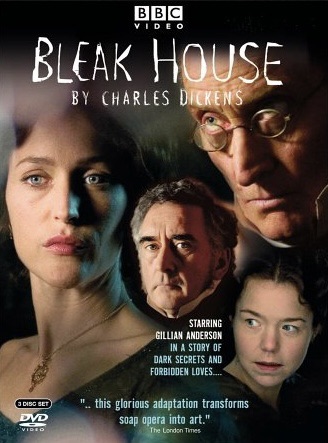

My wife Teresa has watched this series innumerable times. And I along with her! It’s incredibly well done. The stellar cast are absolutely superb, and it’s brilliantly realised in every way, from the music, to the visual look of it.
Few such adaptations could, I think, sustain such repeated viewing, and not pall. That this can and does is down to numerous factors, some already cited. But the central one is the source material. Bleak House is a very great work by a very great writer.
This 2005 BBC adaptation (read more about it here) benefits from a terrific ensemble cast. And they, and the production crew as a whole, are brilliant at getting over the full range of meaning Dickens himself implies in this most highly nuanced of his many novels.
As I’m typing this, he – Dickens – masterfully wields his scalpel-sharp wit, lampooning medical quacks (Dr. Growler, and his ‘black mixture’), the British class system (as Inspector Bucket deliberately overdoes his deference to ‘Sir Leicester Dedlocke, Baronet’), and the vampire Vholes, feeding off Richard Carstone.
There’s an embarrassment of riches here. With so many levels or degrees of nuanced observation, about class, wealth, The Law (from which background Dickens himself came), family ties, religion, honour, and so on.
Shortly after the above-mentioned stuff, we get a great juxtaposition, of Sgt. George and Phil Squod, celebrating the latter’s birthday ‘feast’, with that of Ada Clare’s anniversary, more sumptuously staged, at the home of John Jarndyce. How closely the TV series follows the book, I don’t know.
Some of the themes, like honour and the class system might at first appear rather cutely antiquated. And certainly things have changed. But not so completely as to render such themes redundant.
Two of the ongoing themes that most engage me are: family ties, mostly unfolding in a tragic line, re Esther Summerson’s provenance, as the bastard love child off Miss Barbary (now Lady Dedlocke) and Captain Hawden (lately known as Nemo); and hypocrisy.
There are some lovely moments, re the family, as when Sgt. George’s mum, Mrs Rouncewell, is reunited with him, as he languishes in a jail cell. The latter theme, of hypocrisy is also adroitly explored in numerous ways. From the more seemingly innocent, Mrs Jellaby’s obsession with African charity, to Vholes and Tulkinghorn, who hide behind veneers of professionalism, but enjoy bullying those ‘below’ (and even ‘above’ them) and exist by parasitism.
Another interesting thread is that concerning Inspector Bucket, who may perhaps be the first truly modern detective, of the type so popular in literature nowadays.
In this adaption – although you wouldn’t know it from the publicity materials at the time (which favour Gillian Anderson’s Lady Dedlocke) – the character of Esther Summerson is really the central driver. That said, Lady Dedlocke is perhaps a more realistically flawed character. We pity her, but she can herself be selfish and cruel.
I could blather on endlessly about this marvellous adaptation. But I’ll just finish by reiterating how damnably good the casting is. All the main roles are brilliantly done. Amongst those I’d choose to single out, Charles Dance is pitch-perfect as the icily ‘efficient’ Man of The Law, and several actors excel in more minor roles, such as Johnny Vegas’ Krook and Matthew Kelly’s Turveydrop.
